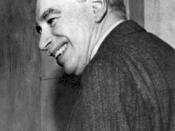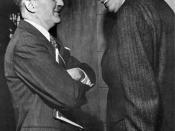In this essay I would like to tell some words about the business cycle, recession and their volatility. A survey of the world economy (published in The Economist) was the basis of this work.
Mostly strong economies are in growth for years and people think 'the good times would never end'. But they exaggerate. We can not say that the business cycle is 'dead'. It appers just not so often than before, thanks to the information technology, flexible markets and globalization. For instance, the survey points out that "the American economy was in recession before the second world war 40% of the time but during the past 20 years has been in recession less than 10% of the time". (4) The situation is similar in most other economies (like in the EU and in Japan).
There are data on business cycles from the 19th century, but there is no exact idea what causes 'booms and busts' in an economy.
Of course, there are a lot of explanations, which we can divide into two main varieties: "those that explain the business cycle as a self-perpetuating process and those that blame recessions on shocks and policy mistakes". (7)
I would now like to mention briefly the main theories. First, the exogenous shocks. In this case, recessions are deemed "totally unpredictable and governments can use fiscal and monetary policies to cushion demand". (7) Second, the Keynesian theory. "John Maynard Keynes blamed recessions on the inherent instability of investment." (7) He explained the cycle in terms of market failure. Lower investment causes higher unemployment. So, to balance the economy, the government must use expansionary policies. The next, the real business-cycle theory considers "productivity shocks as the cause of economic fluctuations". (7) In this case, the government need not to stimulate the economy.


